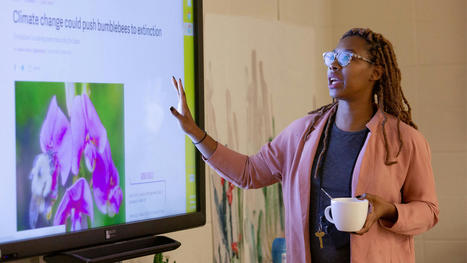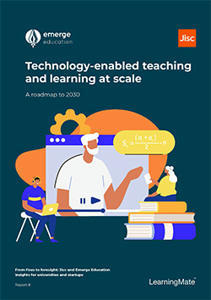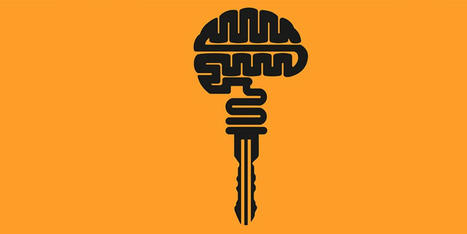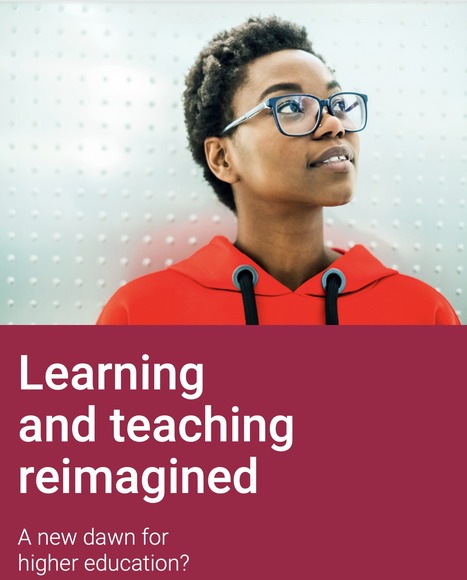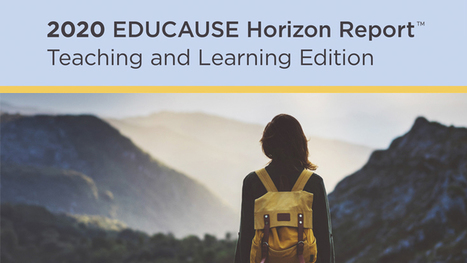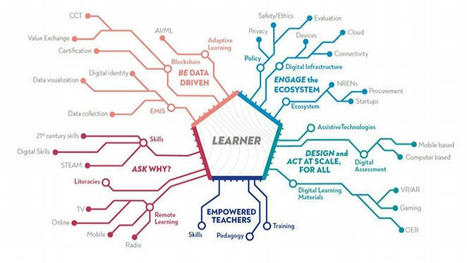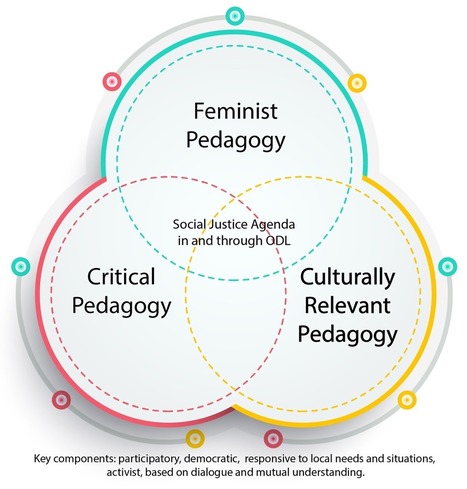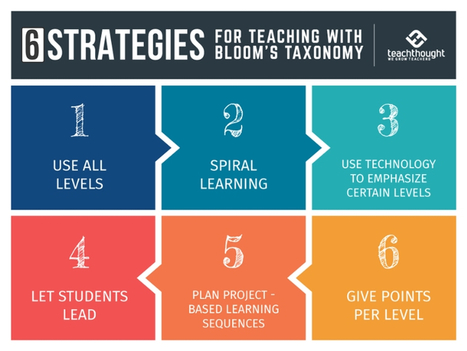Visible thinking routines that encourage students to document and share their ideas can have a profound effect on their learning.
Get Started for FREE
Sign up with Facebook Sign up with X
I don't have a Facebook or a X account

 Your new post is loading... Your new post is loading...
 Your new post is loading... Your new post is loading...
Current selected tag: 'teaching and learning'. Clear
The future of higher education is blended. While Covid-19 has thrown in new challenges, it has created many new opportunities, and it has expedited awareness of (and confidence with) digital ways of working for both staff and students.
"When we look at all the assumptions that have been overturned in higher education because of the pandemic and all the needs that have only grown during this time, what becomes clear is that frameworks that previously worked for higher education are no longer guaranteed to function. Something new is needed, and flipped learning may be exactly the right model for where higher education is headed once the pandemic is over." Via EDTECH@UTRGV 
EDTECH@UTRGV's curator insight,
April 6, 2021 11:36 AM
Its sad that it took a pandemic to wake us up to the potential and benefits of blended learning in higher ed.
This is the opening editorial that Tim Surma and I wrote for the Autumn 2020 edition of Impact on evidence-informed pedagogy. The reason that we collated a publication with this theme is simple and really straightforward: If we, as educational professionals, choose to inform the choices that we make for our practice by the best available evidence, we can make meaningful striking enhancements in our pedagogical practice, and thus on the efficiency, effectiveness, and success of our teaching and of children’s learning.g and
The Higher Education Policy Institute (HEPI) has published a new report with original testimony and practical guidance for UK universities on decolonising higher education. The report establishes that the decolonisation of UK universities is vital for the improvement of course curricula, pedagogical practice, staff wellbeing and the student experience. Miseducation: decolonising curricula, culture and pedagogy in UK universities by Mia Liyanage is based on over 20 hours of interviews with leading figures in academia, student activism and higher education policy. The report’s recommendations include:
Elizabeth E Charles's insight:
Definitely worth a read regarding the call for the decolonisation of universities.
This guest blog has been kindly contributed by Professor Neil Morris, Chair in Educational Technology, School of Education, University of Leeds. He can be found at @NeilMorrisLeeds
The Unbundled University research project, funded by the UK’s Economic and Social Research Council (ESRC grant number ES/P002102/1) and the National Research Foundation in South Africa (NRF grant number 105395), explored a range of issues in relation to the expansion of online education in universities in the UK and South Africa, including partnerships with private companies and the disaggregation of learning and teaching materials for delivery online (‘unbundling’).
Data were collected from interviews with senior leaders, academics, students and private companies in both countries. The data are being written up for publication in academic journals, but given the rapid shift to focus on online education as a result of the Covid-19 pandemic, it is evident that some of the headlines from the research need to be put in the public domain rapidly.
Elizabeth E Charles's insight:
A timely report with the mass move to online teaching/learning.
As universities rush to get all their courses online quickly, there’s a high probability of error but also a lot you can do to succeed. Problems may occur due to overtaxed technological infrastructure, your students’ disorientation and fear, and your own learning curve. On the positive side, you learn for a living, so you are good at it! Being open to the current crisis-driven educational opportunity is a call to action. The reputation and integrity of your institution—and you!—depends upon your offering engaging online classes. (No pressure.) Below are a few tips to get you started.
"This report profiles key trends and emerging technologies and practices shaping the future of teaching and learning and envisions a number of scenarios and implications for that future. It is based on the perspectives and expertise of a global panel of leaders from across the higher education landscape." Via EDTECH@UTRGV 
EDTECH@UTRGV's curator insight,
March 3, 2020 11:28 AM
I always look forward to the publication of the Horizon Report. :-)
In a digitally focused world, education is getting more and more digitized pushing us, teachers and educators, to re-conceptualize what it really means to be a teacher in the 21st century. Whether you are a technological determinist or an instrumentalist, technology has become an essential force shaping much of our teaching and pedagogical practices.
"For most of us, hearing something just once isn’t nearly enough to commit it to memory. But with today’s crowded curriculum, sometimes one explanation is all kids get. Ten years ago, Sal Khan set out to change that with his Khan Academyvideos, which let kids replay lessons as many times as they want." Via EDTECH@UTRGV
From
hurix
Blended learning refers to the use of more than one delivery method to provide enhanced learning. Originally, blended learning referred to the addition of an online segment to the traditional classroom courses. However, the evolution of technology has ensured a more or less equal share between online and offline methods. No matter which component weighs more than the other, the fact remains that blended learning uses more than one approach to learning to ensure better learning outcomes.
Higher education institutions can close the achievement gap among their students through data-driven communication and planning. Higher education advisors are finding new ways to use data analytics to communicate, strategize and execute graduation plans for traditionally underserved students.
At Georgia State University, modern data collection tools give college counselors crucial academic and financial information, allowing them to make more informed suggestions to help their students succeed.
|
What are the key questions that educators should ask when assessing new edtech?
One of the great myths the edtech industry tries to sell us is that it invented personalised learning. Edtech companies trumpet the promise of using computers to teach, with students able to move at their own pace through the material in an individualised way, seeing exactly the content that they need to learn at precisely the right level for them, at just the moment they need to see it. The problem is, it’s not new – and it’s not really personalised.
With a year of hybrid or fully remote learning in the books, colleges and universities may be seeing the writing on the wall – or rather, the screen – about the future of higher education. A digitally-enriched, future-proofed, and layered education experience is simply what students, faculty, and other stakeholders expect moving forward. Via EDTECH@UTRGV
An instructor adapted a meeting strategy from the tech world and found it surprisingly effective in the virtual college classroom.
Education technology — or ‘EdTech’, the use of hardware, software, digital content, data, and information systems in education — supports and enriches teaching and learning and improves education management and delivery. Via Edumorfosis, Nik Peachey
It's important to stay up to date with newest online learning trends. Read this article to learn what's new in microlearning and online video teaching. Via EDTECH@UTRGV
Gender inequality is a pressing issue on a global scale, yet studies on this important issue have stayed on the margins of open and distance learning (ODL) literature. In this study, we critically analyse a batch of ODL literature that is focused on gender inequality in post-secondary and higher education contexts. We use Therborn’s social justice framework to inform and guide the study. This is a comprehensive social justice lens that sees inequality as “a life and death issue,” approaching empowerment as a central area of concern. Qualitative content analysis of 30 years of peer-reviewed literature reveals patriarchy and androcentrism as significant mechanisms that continue to produce gender inequality, in particular in women’s access to educational resources and formal learning opportunities. We highlight three themes that emerged in the content analysis: (1) ODL and equal opportunity; (2) Feminism and gender-sensitive curriculum design; and (3) Culturally relevant curriculum design. We critique views of access to technology-enabled education as an instrument for social justice, and provide a pedagogical model for an ODL curriculum centred on empowerment and agency, two concepts closely linked to existential inequality. We argue that such a curriculum is public service and requires a model of education that is based on participation and co-construction, and lies at the intersection of critical, feminist, and culturally relevant pedagogical practices.
Bloom’s Taxonomy can be a powerful tool to transform teaching and learning.
For decades, education reform has been focused on curriculum, assessment, instruction, and more recently standards, and data, with these efforts only bleeding over into how students think briefly, and by chance. This means that the focus of finite teacher and school resources are not on promoting thinking and understanding, but rather what kinds of things students are going to be thinking about and how they’ll prove they understand them.
Over the last week I've received a bunch of emails and Tweets from people looking for my suggestions on tools and tactics for teaching online if schools are closed due to COVID-19. I'm going to start this post with some tips for giving online instruction then get into some recommended tools.
Elizabeth E Charles's insight:
Good tips and tools.
It seems that the onset of a new decade is enough to get a lot of folk involved with ed tech questioning its position in the grand scheme of things. There seems to be a whiff of gloom and despondency in the air? I give you the amazing ‘The 100 Worst Ed-Tech Debacles of the Decade‘ piece from Audrey Watters of Hack Education, and Dean Shareski’s ‘I Don’t Think I’m an EdTech Guy Anymore‘ thoughtful reflection as starters for 10.
I have been teaching various levels of reading skills and composition to native and non-native speakers, to immigrants and U.S. citizens, to people with talent and interest, and I have one thing to say:
This piece was written for The White House Symposium on the Future of Education R&D and Digital Learning, which took place on Oct. 5. It was originally published on Bror Saxberg’s blog and is reprinted with permission.
Technology is changing the way almost all industries work beyond recognition. It’s also changing the nature of what skills humans need to succeed. This has profound implications for our education and training systems—we will need to be much more systematic and efficient to help many more learners succeed in the long haul.
There are many similarities to adults and students when it comes to learning. If you were an auditory learner in school, you probably still prefer that learning method [1]. If you were a verbal learner you still prefer that. Adults are able to learn from additional styles as they know what they need to pick out from training, and they know the impact it will have on their job if they do not. The motivation to learn is more relevant to adults than it is to students, but trainers need to be aware of learner preferences. |



